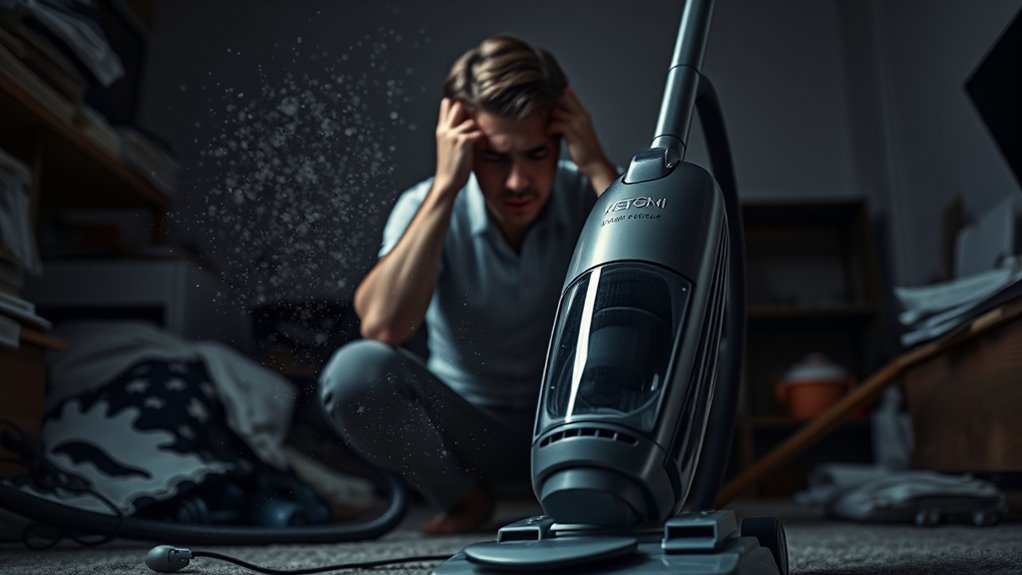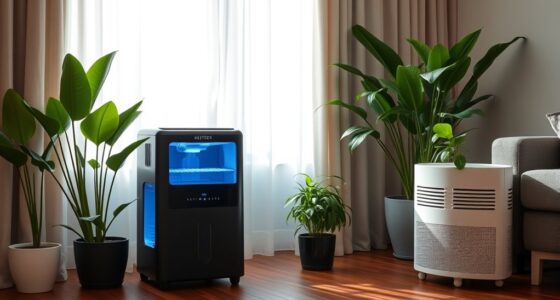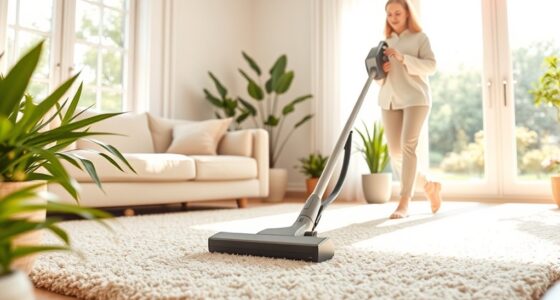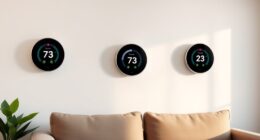Vacuum noise can drastically disrupt your home environment, making it feel chaotic and overwhelming. This constant background din interferes with your concentration and elevates stress levels, leading to irritability and emotional tension. If you live with others, the loud sound can create tension in shared spaces, affecting relationships. Over time, this exposure can even contribute to anxiety and depression. Understanding these impacts can help you manage your environment better, and there’s more to discover about effective strategies.
Key Takeaways
- Vacuum noise contributes to household noise pollution, creating a chaotic environment that increases stress and impacts overall wellbeing.
- The sound of vacuums can disrupt concentration, leading to feelings of frustration and heightened anxiety during daily tasks.
- In shared living spaces, vacuum noise may disturb others, fostering tension and collective stress among housemates or family members.
- Chronic exposure to vacuum noise can lead to sustained stress and may contribute to long-term mental health issues like anxiety and depression.
- Implementing noise-reduction strategies and awareness can help mitigate the emotional impacts of vacuum noise, promoting a healthier living environment.

While you might not think about it often, the noise created by vacuums can substantially affect your stress levels. Every time you turn on that appliance, it generates a level of noise that can contribute to your overall experience of noise pollution in your home. This isn’t just about an annoying whirring sound; it can have real consequences for your mental health. When you’re surrounded by constant noise, it can create an environment that feels chaotic and overwhelming, making it harder for you to relax.
You might notice that when you’re vacuuming, it’s tough to concentrate on other tasks or even just enjoy a moment of peace. That’s because the sound waves from the vacuum can disrupt your thoughts and feelings. If you’re already feeling stressed or anxious, the added noise can amplify those emotions, making it seem like you’re in a never-ending cycle of tension. You might find it hard to unwind, and this can lead to feelings of frustration or irritability.
Moreover, if you live in a shared space or an apartment, the noise from your vacuum can also disturb others, contributing to a collective sense of stress. It’s interesting to *ponder* that while you’re trying to create a clean and orderly environment, the method you use can unintentionally lead to increased stress for both you and those around you. This shared experience of noise pollution can affect relationships, as it creates tension in spaces where people should feel comfortable and safe.
What’s even more concerning is the long-term impact of frequent exposure to such noise levels. The connection between noise pollution and mental health is well documented. If your mental space is constantly disrupted by the sounds of household chores, it can lead to chronic stress, anxiety, and even depression over time. You may not realize it, but that vacuum could be contributing to a broader cycle of stress in your life. Engaging in somatic therapy can be a beneficial way to address the emotional impacts of such stressors.
Frequently Asked Questions
Can Vacuum Noise Affect Pets’ Behavior and Wellbeing?
Yes, vacuum noise can definitely affect your pets’ behavior and wellbeing. If your pet’s noise sensitivity is high, the sound might trigger anxiety, making them more restless or fearful. You might notice them hiding, barking, or acting out during cleaning sessions. It’s important to be mindful of your pet’s reactions and provide a safe space where they can feel secure. Consider using calming aids or playing soothing music to help ease their anxiety.
Are Certain Vacuum Models Quieter Than Others?
Absolutely, some vacuum models are quieter than others! If you’ve ever wondered how it feels to clean with a whisper instead of a roar, you’ll love the quiet models available today. These vacuums boast sound levels that won’t disturb your peace and quiet. Brands often provide sound ratings, so you can easily find one that fits your need for a calm cleaning experience without the noisy chaos. Happy vacuuming!
How Can I Minimize Vacuum Noise in My Home?
To minimize vacuum noise in your home, consider implementing soundproofing strategies like adding rugs or carpets to absorb sound. You might also use noise-canceling devices, which can help reduce the impact of the vacuum’s noise. Additionally, try running your vacuum during quieter hours or when you’re out of the house. Investing in a quieter vacuum model can also make a significant difference in the overall noise levels while cleaning.
Is Vacuum Noise More Stressful for Children Than Adults?
Vacuum noise can feel like a thunderstorm for kids, often more stressful than for adults. Children are still developing, making them more sensitive to noise, which can disrupt their focus and play. Their heightened noise sensitivity means they might react more strongly to the sudden roar of a vacuum. To help, consider creating a quieter environment or involving them in activities that distract from the sound, easing their stress during cleaning time.
What Are the Long-Term Effects of Prolonged Exposure to Vacuum Noise?
Prolonged exposure to vacuum noise can lead to psychological fatigue and sleep disruption. You might find it harder to concentrate during the day due to constant background noise, which exhausts your mental resources. Over time, this fatigue may affect your mood and overall well-being. If you’re frequently exposed, consider taking breaks or using quieter alternatives to minimize these effects. Prioritizing a peaceful environment can help you maintain your mental health and improve your sleep quality.
Conclusion
You might not realize it, but that constant hum of the vacuum cleaner can sneak into your stress levels like a thief in the night. Just as a gentle breeze rustles leaves, noise can rattle your peace of mind. When you’re surrounded by the roar of cleaning, it’s easy to feel overwhelmed. But remember, finding moments of quiet, like a warm cup of tea on a rainy day, can restore your wellbeing and help you reclaim your calm.









